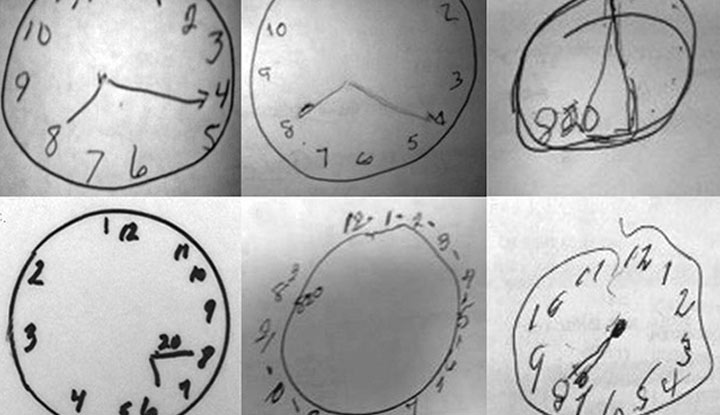Cognitive tests are short, quick tests to check how well your brain is functioning. These tests don’t diagnose specific diseases. Instead, they identify a problem with cognition and the need for more in-depth testing.
Advertisement
Cleveland Clinic is a non-profit academic medical center. Advertising on our site helps support our mission. We do not endorse non-Cleveland Clinic products or services. Policy

Image content: This image is available to view online.
View image online (https://my.clevelandclinic.org/-/scassets/images/org/health/articles/22306-cognitive-test)
A cognitive test checks for problems with your mental functioning (cognition). The test involves answering basic questions and performing simple tasks. You don’t need to study before taking this test.
Advertisement
Cleveland Clinic is a non-profit academic medical center. Advertising on our site helps support our mission. We do not endorse non-Cleveland Clinic products or services. Policy
Cognition is your brain’s ability to process all the information it takes in from your senses. Cognition includes:
This is also called a cognitive impairment test and a cognitive screening test.
A healthcare provider may recommend a cognitive test if they suspect mental decline or cognitive impairment (issues with mental functioning). Some examples may include:
Even if there isn’t any suspicion of an underlying health condition that affects cognition, your provider may still perform a cognitive test after age 65. This is due to natural changes in how your brain works as your body ages.
A cognitive test consists of a few questions or tasks that you answer or perform to the best of your ability. This test doesn’t require you to research information (study) or prepare in any way. You’ll simply respond or follow the instructions that your provider gives you. It should only take a few minutes up to 15 minutes in total. It’s usually part of a regular health exam.
Advertisement
You’ll take this test in a healthcare provider’s office. Depending on your needs, this may be done in a hospital setting, especially after an accident or traumatic brain injury.
There are several types of cognitive tests. The three most common include:
Cognitive screening tests check various brain functions that relate to cognition. Some examples of questions or tasks your provider may ask include:
Your provider will give you more information about how you did after the test. If any questions were challenging or you had trouble answering a few, that’s OK — you don’t need a perfect score. Your provider may recommend additional testing if the results are abnormal. They’ll let you know what your situation looks like, as it can vary from person to person.
The word “test” may stress you out. So, it’s normal to feel a bit nervous before you see your provider. But this isn’t a typical diagnostic test or an exam you take in school. This type of test is quick and assesses your thinking abilities.
It requires follow-up testing to make a diagnosis, especially if your provider suspects mild cognitive impairment or dementia.
Cognitive screening tests reveal if there’s a problem with mental functioning. However, the test can’t diagnose a specific disease, and it doesn’t reveal the severity, cause or location of impairment in your brain.
The test results come as a score that’s either normal or below normal. A normal score may mean you’re your brain is functioning as expected. But in some cases, you may still have symptoms of an underlying cognitive impairment with a normal score. Additional testing may be necessary.
Advertisement
A below-normal score means that your provider suspects cognitive impairment. They’ll recommend follow-up testing or recommend you see a neurologist. This is a provider who specializes in diagnosing and treating conditions that affect your brain. Your provider may order a neuropsychological assessment.
There are some cognitive tests that you or a loved one can take at home to give you an idea of what you can expect at a healthcare provider’s office. One such test is the Self-Administered Gerocognitive Exam (SAGE). You can find it on the internet.
Like other cognitive tests, it assesses basic identification, language, reasoning, problem-solving and memory skills.
But remember, no cognitive test can diagnose Alzheimer’s disease, dementia or any other specific condition. But the tests can be a helpful screening tool for cognitive impairment.
Taking an at-home cognitive test is a reasonable first step if you think you or a loved one are having trouble with cognition.
After completing the test, make an appointment with a healthcare provider. They can:
Advertisement
You might feel intimidated by the word “test,” but there’s nothing to fear during a cognitive test. This is more of an evaluation that gives a healthcare provider more insight into how your brain works. It only takes a few minutes, and you should receive a score shortly after taking the test.
But knowing your score is only the start of the process. You’ll need additional testing to learn more. Your provider will explain your score and the next steps, if you need to take any. If you have any questions about the test or what you can expect following a cognitive test, your care team is here to help.
Advertisement

Sign up for our Health Essentials emails for expert guidance on nutrition, fitness, sleep, skin care and more.
Learn more about the Health Library and our editorial process.
Cleveland Clinic’s health articles are based on evidence-backed information and review by medical professionals to ensure accuracy, reliability and up-to-date clinical standards.
Cleveland Clinic’s health articles are based on evidence-backed information and review by medical professionals to ensure accuracy, reliability and up-to-date clinical standards.
Memory loss, dementia and other cognitive disorders need personalized treatment for the best results. Cleveland Clinic’s brain health experts are here to help.
